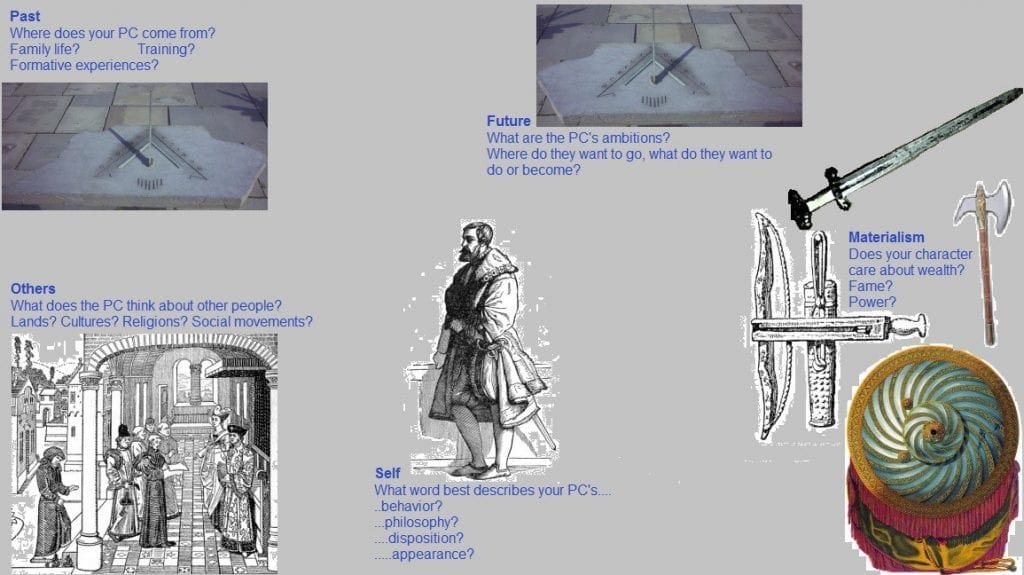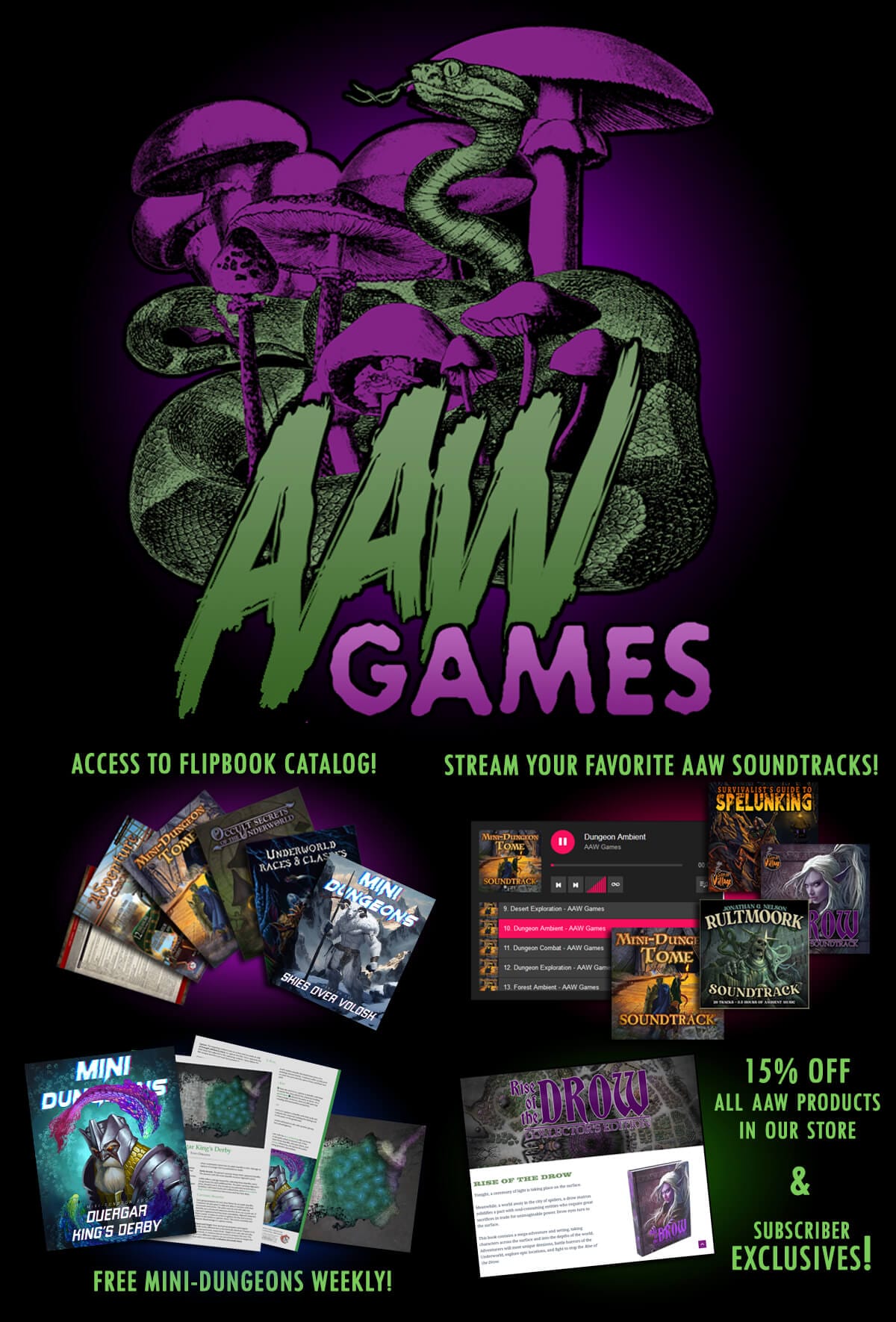A couple of weeks ago we got quite a response to an article (10 Ways to Run a Better Tabletop Game) and several folks responded with how they implement in-depth character creation—thank you! One of these approaches is so simple that its originator, John Hughes, broke it into a simple sketch. His thoughts on that area of game design are below. Enjoy!
 It’s never easy coming up with a character concept—knowing your character’s goals, hopes, quirks and foibles. Too often we ignore the intangible qualities of our imagined hero and focus on the mechanics of the numbers and abilities instead. During a World of Darkness campaign, a dear friend (but lackluster roleplayer) came up to me one day, proclaiming proudly, “I’ve got a new character concept for a vampire: Dominate plus Telepathy.”
It’s never easy coming up with a character concept—knowing your character’s goals, hopes, quirks and foibles. Too often we ignore the intangible qualities of our imagined hero and focus on the mechanics of the numbers and abilities instead. During a World of Darkness campaign, a dear friend (but lackluster roleplayer) came up to me one day, proclaiming proudly, “I’ve got a new character concept for a vampire: Dominate plus Telepathy.”
That’s not a concept—that’s two powers strung together—and while that might be the extreme of mistaking mechanics for personality, I believe that all of us occasionally make this trade-off. Whether the setting is a casual pick-up game or a convention event, when faced with a different group at the table and a new piece of paper in hand, the temptation as the player to develop only a cursory profile can be overwhelming. Additionally, other players might enjoy the game for the sake of the combat and don’t want to divert time and effort into fleshing out their creation.
Over time, I’ve developed simple steps that, regardless of playing style, encourages quick but meaningful examination of a hero that more fully invests players in their creations.
Step 1: Five Adjectives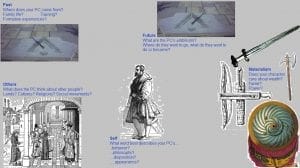
The first step is to come up with five adjectives to describe your character; the idea is not to just develop a string of five words from the same category: e.g. physical traits like strong, swift, lithe, nimble and sure-footed. Without variety, five adjectives are no better than one. Instead pick one word from each of the following five categories to give a character instant depth:
Past This should describe something about how the character arrived at today.
- Where did they come from?
- How did training or other major events change and shape them?
- What was their family situation (or lack thereof) and how did it affect their adolescence?
Future You have one word describing the hero’s formative experience, now imagine the more aspirational facets of this individual.
- How do they want to be remembered
- What word best describes what this character hopes to do?
- What mark do they want to leave or what role would they like to fulfill?
 Self Bringing the time vista back to the present, now we’ll look inward.
Self Bringing the time vista back to the present, now we’ll look inward.
- What word best describes the character in behavior, philosophy, or appearance?
- Is this a way the hero presents themselves as a facade, or does this represent a true personality facet?
Others Look around the hero and empathize with how they must feel about the world.
- What word best describes what your character think about others? (The definition of others could be other tribes, races, traditional enemies, close allies, nations, classes, alignments, religions.)
- How does your character treat them?
- What does the hero expect outsiders to think upon meeting?
Stuff How an individual deals with other people can be completely different from how they deal with objects.
- What word best describes the character’s relation to goods, services and social bearing?
- Do they show an interest in tangible objects like weapons or wealth?
- Does the character prefer intangibles like fame or power?
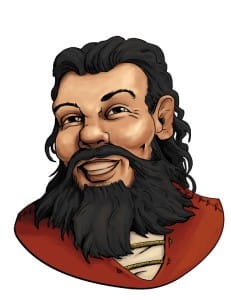 Remember, the quality of adjectives count! Why be “happy” when you can be cheerful, joyful, enthusiastic or even maniacal? This step is a great opportunity to break out those words you only memorized for the SAT; you may never use “nonagenarian” in a sentence, but it could be the perfect word for your wizard, who might also be decrepit or wizened (assuming your wizard is a human—for an elven wizard, “nonagenarian” is the equivalent to immature or untried.)
Remember, the quality of adjectives count! Why be “happy” when you can be cheerful, joyful, enthusiastic or even maniacal? This step is a great opportunity to break out those words you only memorized for the SAT; you may never use “nonagenarian” in a sentence, but it could be the perfect word for your wizard, who might also be decrepit or wizened (assuming your wizard is a human—for an elven wizard, “nonagenarian” is the equivalent to immature or untried.)
Don’t be afraid to try unconventional words for your concept! Many people can see a cleric as devout, but what if hanging around the temple all the time instead has made the disciple ingratiating or even sycophantic? Words with greater context or specific meaning will produce a more concrete vision of the character from this exercise.
Step 2: Draw Your Character
When describing the five areas above, I’ll draw little pictures to help visualize what I mean—I also draw in an effort to overcome any resistance or fear of this next step. This part of the exercise tends to draw heavily on the class, armor, or weapon of a character, so in some ways the illustration serves only to reinforce the role of those mechanics. Nonetheless, by encouraging the players to draw the character, the image triggers other areas of the brain, giving visual context to both the adjectives and the mechanics. The drawing doesn’t have to be great or even good, but encourage the player to try—the rewards are immediate and the practice makes the next time easier.
Note: I can’t claim to have devised this step entirely on my own—I came across a version of this idea in On The Edge by Jonathan Tweet and have been using it for two decades.
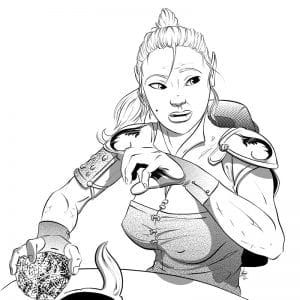 I discourage names from movies or books when players flesh out the last part of the character. An original name reinforces ownership of the hero—names like Bob or Fred can disrupt the fantasy mood—so put some effort into a plausibly authentic name.
I discourage names from movies or books when players flesh out the last part of the character. An original name reinforces ownership of the hero—names like Bob or Fred can disrupt the fantasy mood—so put some effort into a plausibly authentic name.
Hopefully this quick, easy exercise will help make characters more interesting for both you and your companions during your next adventure!
Do you have a contribution or idea for Meta Thursdays? Send us your ideas (after reading the submission guidelines) to submit(at)adventureaweek.com with “Meta Thursday” in the subject line!

